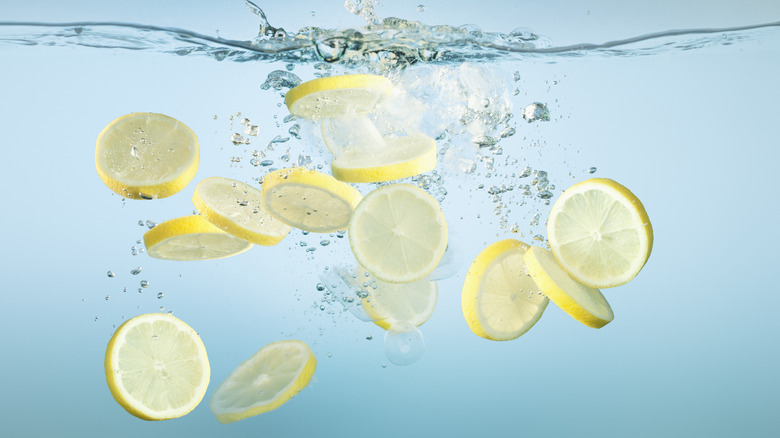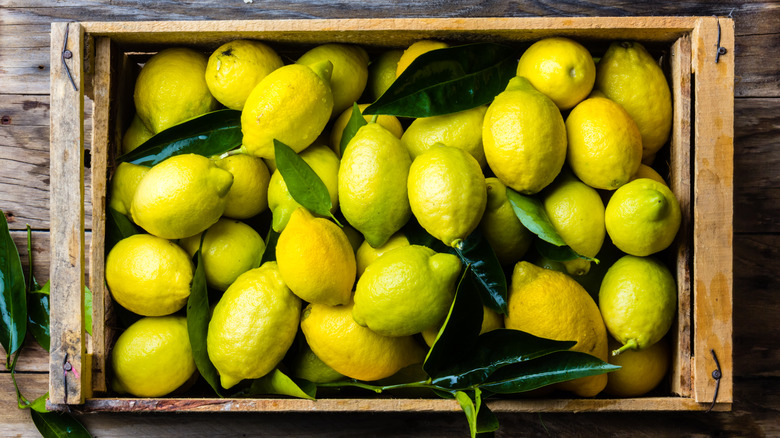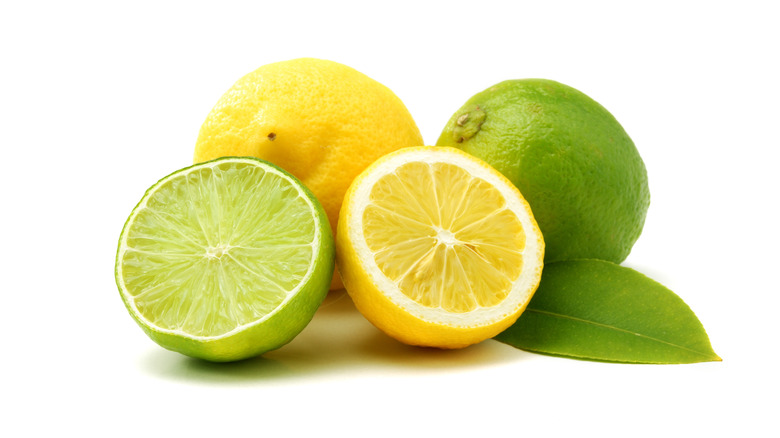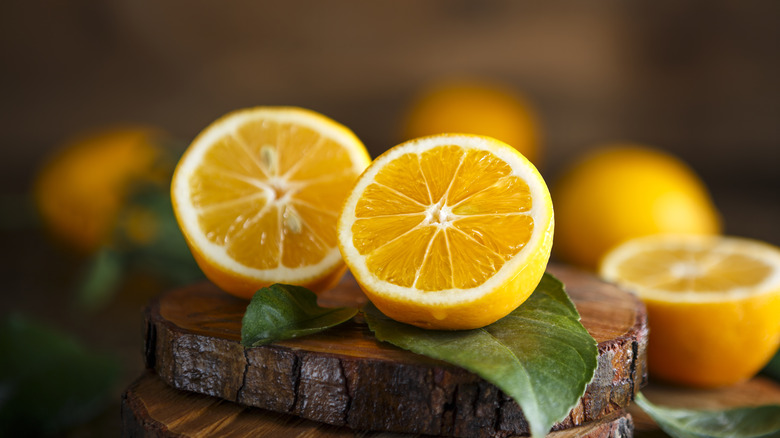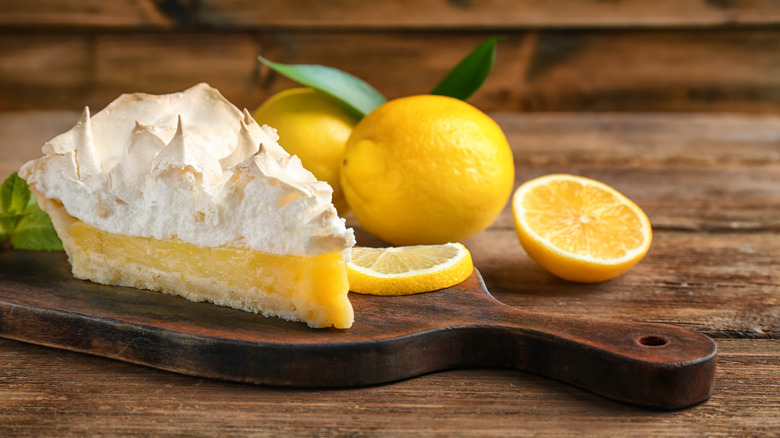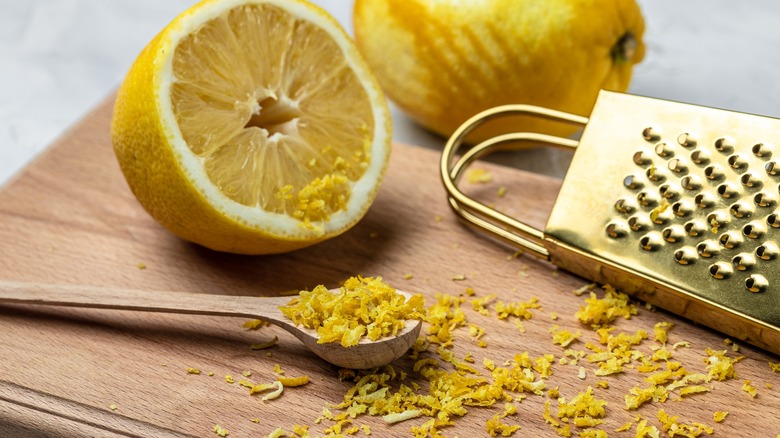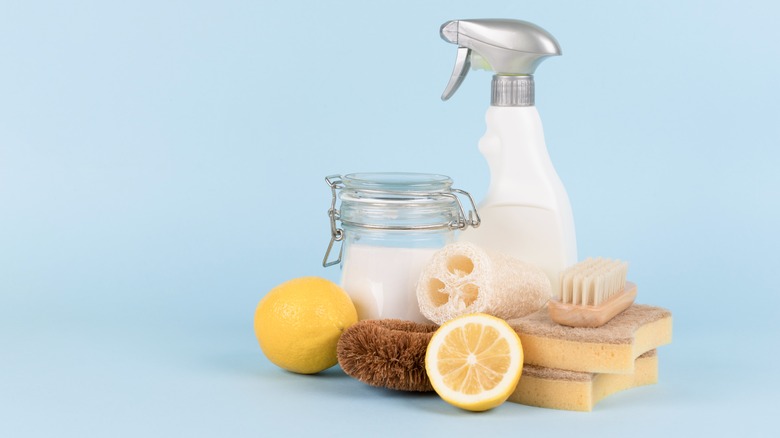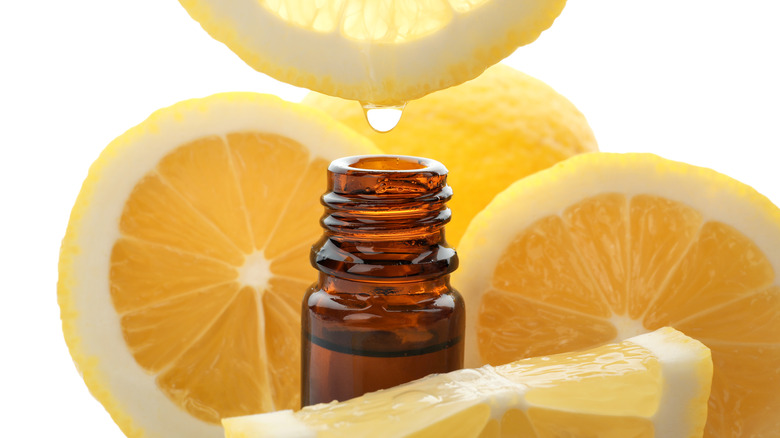All Your Questions About Lemons Finally Answered
Lemons hold a cherished place in kitchens worldwide, adding a burst of sunny color and citrusy flavor. These tangy fruits are known for their versatility and power to enhance many dishes, from marinades to cocktails, from pasta sauces to desserts. Lemons are the chameleons of the food world, transforming from bitter fruits to the ultimate seasoning that can add depth to a variety of savory and sweet flavors.
As well as their gastronomic virtues, their high vitamin content means that lemons are the perfect food to always have on hand, ready to add to a quick dinner, or make an immune-boosting tonic. Their year-round availability means there is no excuse not to use these citrus wonders to their full potential, whatever the season.
Lemon utility expands beyond the kitchen, lending their talents to essential oils, cleaning products, and beauty regimens. Let's venture into the colorful world of lemons and answer all your questions about the ways this unassuming citrus fruit can enhance your life.
Where did lemons originate?
Have you ever stopped to wonder where the amazing lemon actually came from? Probably not, but on its journey to garnish your ice water or gin and tonic, the lemon brings with it a history dating back thousands of years.
Lemons are grown all over the world, from northern Europe to South America and just about everywhere in between. However, this was not always the case, as lemons have journeyed widely across the globe in the last millennium. Originally native to southern Asia — possibly India, though this is disputed — the lemon first appeared in Europe as early as the first or second century AD and in Africa by 700 AD. However, it wasn't until the 15th century that their culinary popularity rose.
Christopher Columbus played a pivotal role, introducing this sunny fruit to the Americas, and by the end of the 19th century, there was a thriving lemon industry in California, which remains to this day.
Although lemon trees can be successfully grown anywhere that the temperature is above 50 degrees Fahrenheit, they thrive in warm climates, particularly near the coast. The Mediterranean and Mexico are among the world's top lemon producers, along with their native Asia, thanks to their suitable climates.
The worldwide interest in lemons was due not only to their unique flavor but also their versatility. Beyond their culinary exploits, lemons are used in cleaning products, beauty treatments, and traditional medicine.
What are a few popular varieties of lemon?
Though a trip to your local grocery store might lead you straight to that bag of generic lemons, you may be surprised at the varieties on offer if you shop at farmers' markets or specialty stores. The choice of lemon can make a big difference to your dish, as each type has its own unique characteristics. Knowing a few of the most common lemon varieties will help you make the best choice.
Grown all year long, the Eureka lemon is the lemon you are most likely to pick up in the supermarket in the United States or UK. It doesn't have many seeds and is juicy and tangy, making it a great all-round option for cooking. Lisbon lemons are also commonly found in grocery stores. They have a smoother rind than Eureka lemons, but the flavor is very similar.
Meyer lemons are the most common sweet lemons you will likely encounter. They are smaller than most lemons and darker in color since they are actually a hybrid of lemons and mandarins. Their sweet flavor makes them ideal for use in desserts and drinks.
If you spot large lemons in your local store, they may be Ponderosa. This hybrid variety has a very bumpy skin and tangy flavor with a hint of sweetness. Their thick skins make them ideal for a dish that asks for lots of lemon zest.
What are the health benefits of lemons?
As we delight in the freshness lemons can bring to various savory and sweet dishes, there is even more to celebrate. Adding lemons to your food regularly isn't just a significant move in terms of flavor — it's also a boost to your health.
Lemons are famously rich in vitamin C, an antioxidant integral to our immune systems' function. And it's crucial for skin health and helps the body absorb iron.
Yet, the potential benefits of lemons don't stop there, as they contain other antioxidants, like flavonoids and limonoids. These compounds not only reduce free radicals in the body, but some studies have shown they are capable of reducing the growth of cancer cells and may result in a significant decrease in cognitive decline (via the journal Frontiers). Though research in these fields is ongoing, this promising information suggests that lemons could be a key weapon in the fight against serious disease.
Lemons also have potassium, an essential mineral for the heart and nervous system. This is especially important for anyone at risk of high blood pressure, as potassium can counteract the effects of too much sodium and lower the chances of heart disease and stroke. Next time you squeeze a lemon as you're cooking, relish the fact that it not only adds a fantastic depth of flavor but can also strengthen your body's natural defenses and reduce the chance of illness.
Can lemon juice be used to treat the cold and flu?
When suffering from the cold or flu, many of us instinctively reach for a lemon drink, and with its abundance of vitamin C, this seems to make sense. Lemons can certainly boost the immune system, but can they really shorten the length of a cold or flu?
While lemon juice is unlikely to affect the virus itself, it may relieve some of the symptoms, making you feel less unwell for the duration of the illness. One point to consider is that lemon juice is often taken in hot water during times of illness, and the water itself may help some of the symptoms. According to Merlin Thomas, professor at Monash University, "Certainly, the steam from any hot drink is able to dissolve nasal mucus to open blocked nose and sinuses, providing relief for a few minutes at least" (via ABC).
Swirling some honey into a hot lemon drink is likely to have a soothing effect on a sore throat, and the antibacterial properties of the lemon may prevent it from worsening. In the case of cold and flu, prevention is better than cure, and lemons can play a part in that. The vitamin C keeps your immune system in top working order and can also keep your respiratory system and kidneys working well, meaning you will feel better all-round. Ultimately, while lemons are a great tool in the defense against cold and flu, they should be seen as supportive action rather than a treatment in their own right.
How do lemons compare to limes?
Lemons and limes, the dynamic duo of citrus fruit and long-time kitchen companions, have been used in cooking for centuries. Both have vibrant zest and lively flavors, but have you ever wondered if the two can be used interchangeably or how they stack up in terms of nutrition?
Distinguishing between the two at a glance is easy — lemons are oval with bright yellow skins, whereas limes are smaller, rounder, and a vivid green color. Flavor-wise, lemons have that familiar, sour flavor but can sometimes surprise with a hint of sweetness, making them ideal for use in savory and sweet dishes across many cuisines. Limes have a more intense flavor and can have bitter undertones. Limes are used extensively in savory dishes in Mexican and South American cuisine, and though used in desserts such as Key Lime Pie, they need more sugar to balance their tartness.
Nutritionally, the two fruits align closely, containing similar quantities of carbs, fiber, and protein — and no fat. Lemons do have a slight edge, though, on the vitamins and minerals front, with 30% more vitamin C and more folate (vitamin B9) than their green counterparts.
Despite these differences, lemons and limes make a good substitute for each other if you're lacking one when cooking. Just be sure to add a small amount at a time and let your taste buds guide you. You never know — you may end up creating a new culinary masterpiece that will become your signature dish!
Which lemons are the sweetest?
While lemons are famed for their sour, face-puckering flavor, there are some varieties that are surprisingly sweet — tailor-made for desserts and drinks. With so many different lemons available — and before you embark on your citrus culinary adventure – it's a good idea to know which ones boast the title of sweetest.
First is the Meyer lemon, a citrus originally from China that is popular on the culinary scene. These distinctive lemons are a deeper, more orange color than regular lemons and are thought to be a delightful cross between a lemon and mandarin, giving them a sweeter flavor. Meyer lemons have a short growing season, so if you see them at your local market, snap them up while you can. You can always freeze the lemons if you want to have them available all year.
Another noteworthy sweet lemon variety is the Amalfi lemon. These large, bright lemons have thick skin and contain a lower-acidity juice than most. They are famously used to make the syrupy lemon liqueur Limoncello and feature in many Italian desserts. These deliciously sweet lemons can only be grown on the Amalfi coast, so sourcing them can be difficult and expensive.
If you are looking to create a citrus masterpiece that is more mellow than tart, consider opting for a lemon that is lower in acidity and boasts a sweeter profile. The Meyer and Amalfi lemons are both excellent choices.
How can lemons be used in savory dishes?
The wonderfully versatile nature of lemons means they can weave their way into lots of dishes, both sweet and savory. The unmistakable sourness of lemon juice and zest can provide balance to rich flavors and create a freshness that livens up every bite.
A pivotal role for lemon in savory food is in marinades and dressings. As well as adding flavor to meat and fish, a lemon juice marinade will begin to break down the proteins in the flesh, making the meat perfectly tender after cooking. In the case of ceviche, the fish isn't even cooked after marinating, as the lemon juice (or lime juice) breaks down the protein enough to make it edible.
For those seeking to enhance the savory citrus element even further, a lemon butter sauce is a delicious option. The acidic lemon balances beautifully with the rich butter and pairs with a delicate white fish such as sole.
If you are looking for a savory dish that really heroes the lemons, try a Moroccan Tagine. Made with preserved lemons, the citrus flavor is much more pronounced, and the whole lemon can be eaten, including the peel. Preserved lemons have an added health benefit over raw, as they are packed with gut-friendly probiotics that are produced during the preserving process. They are easy to make at home, but take three to four weeks before they are ready, so be sure to prepare in advance.
How can lemons be used in sweet dishes?
Though renowned for their sour flavor, lemons make a delicious addition to sweet treats and desserts. When balanced with just the right amount of sugar, lemons add a bright acidity that perfectly contrasts the sweetness and creates a refreshing treat.
A perfect example of this is the much-loved dessert lemon meringue pie, which beautifully showcases the versatility of this vibrant citrus fruit. The highlight of the pie is its tangy lemon curd filling that complements the pillow-like meringue on top. Together with the light buttery crust, lemon meringue pie showcases how pairing tart lemons with the right ingredients can create a harmonious dessert with a delicate balance of sweet and sour.
Another way lemons make their way into our favorite sweet treats is in muffins and cakes. Whether a moist slice of lemon drizzle cake or a fluffy lemon muffin, both the juice and zest of the lemon can make a great addition to these classic baked goods. A lemon-based glaze often sits atop these delicious treats, providing an extra lemony burst as you take the first bite.
If you are looking for a stronger citrus hit from a dessert, lemon sorbet is the way to go. Though it still contains sugar, the tart lemon flavor is more prominent than most desserts, making it a refreshing end to a meal. Easy to make at home, this should be a go-to dessert if you like to end your meal with a zing.
What drinks can be made with lemon juice?
As well as being a versatile cooking ingredient, lemons are a great addition to many beverages, from healthy green juices to indulgent alcoholic cocktails. As with cooking, the key when using lemon in drinks is to balance its natural sharpness with mellower ingredients to make sure it doesn't overpower the drink.
To take advantage of the many health benefits of lemons, try adding some juice to an earthy green juice or smoothie. A vitamin-packed juice is a refreshing way to start your day or act as a mid-afternoon pick-me-up. The lemon juice not only brightens the flavor of the drink but also enhances the absorption of the iron from the green vegetables, giving you a double boost of nutrients.
At the other end of the drinks scale, lemon juice is a staple in the world of mixology, lifting the flavor of other ingredients and occasionally acting as the star of the show, in the case of the lemon drop cocktail. This simple, zingy cocktail is made by mixing lemon juice with vodka and sometimes an orange liqueur such as Triple Sec or Cointreau. The lemon flavor is front and center of this drink, creating the perfect blend of tangy and sweet.
For a more subtle lemon flavor, classic cocktails such as whiskey sour or Tom Collins feature lemon as a background flavor to enhance the other components of the drink. Non-alcoholic drinks like sparkling water can also benefit from a squeeze of lemon to provide added freshness.
Why do lemons make your face pucker?
Lemons are a delicious addition to virtually any dish and can be used in many ways, but try biting straight into one, and your taste buds are in for a shock! Your face will contort into shapes you never knew possible, potentially attracting funny looks from the next table. What is it about lemons that allows them to deceive us so easily — to be beautifully mellow in our favorite dessert but attack our palate as soon as we let our guard down?
The culprit is citric acid, which gives lemons a low pH. Our mouths puckering is a built-in defense mechanism against toxic substances, and a mouthful of lemon will set off the alarm. Many fruits contain citric acid, but lemons and limes contain significantly more than others. This is why snacking on a slice of orange is a satisfying treat, whereas munching on a lemon is an assault on the senses. The high acidity level sends a signal to your brain to watch out for potential danger, and your brain responds by scrunching your face and producing excess saliva.
The good news is that the citric acid that causes this reaction is also what makes us love lemons when cooking. The acidity level allows the lemon to cut through the sweetness of many desserts and elevate other ingredients in our favorite sauces. So, while it may be best to avoid biting into a whole lemon too often, we can't forget the many ways in which citric acid can enhance our culinary endeavors.
What is the shelf life of lemons and lemon juice?
It's a good idea to always keep a few lemons in your pantry, given the many uses they have in the home. Understanding how long lemons stay fresh is important to reduce food waste and maximize their usage.
The good news is that due to their thick skins, whole lemons do not spoil easily and can be fresh for a number of weeks if stored correctly. Whole lemons stored in the refrigerator will last up to a month, especially if you keep them away from other produce, such as bananas and apples, which produce ethylene gas that has a ripening effect. If you store lemons at room temperature, they will last a week or two, depending on how cool the room is.
Once a lemon has been cut open, its shelf-life drops considerably. Wrapping it in a plastic bag or storing in an airtight container will help keep it fresh, but only for three or four days. If mold starts to appear on a cut lemon, be sure to throw it out.
Freshly squeezed lemon juice can be kept in an airtight container in the fridge for a few days but shouldn't be kept at room temperature for more than a few hours. If you have a surplus of lemons, you can freeze them either as slices or squeeze the juice into an ice cube tray to create convenient blocks of juice that can be used when needed.
What is the difference between lemon juice and zest?
As you prepare a lemon to add to your dish, it may cross your mind: Should I juice it or zest it? Does it matter? Can the two be used interchangeably? If you are going to master the art of cooking with citrus, then it's important to know the answers to these questions.
Lemon zest is the bright yellow outer peel of the lemon that protects the fruit inside. By grating it very finely, either with a lemon zester or a small cheese grater, you can create tiny slivers of lemon zest, which can be added to savory dishes, desserts, and drinks. Lemon zest imparts a strong, lemony flavor to a dish without any sour notes. When zesting the lemon, take care not to include any of the white pith from under the zest, as this will give the zest a bitter note.
Lemon juice, on the other hand, is tart and sour due to its high acid content. Lemon juice is the perfect ingredient to brighten up the flavor of savory dishes but must be balanced with sugar when used in desserts. In most cases, lemon juice and zest can be used in tandem with each other, providing different levels of tartness and lemon flavor. If you are short of one, you could try replacing it with the other, but be prepared for different results both in terms of texture and flavor.
What is the difference between unwaxed and waxed lemons?
When selecting your lemons at the grocery store, you may have seen them labeled as either waxed or unwaxed and wondered whether you need to pay attention to this. Adding a wax coating to lemons is a common practice to protect the fruit during transportation – but generally people don't want to consume the wax if possible.
If your only plan for the lemons is to use the juice, there is no reason to worry about the wax coating, as it will not affect the juice. However, if you wish to zest the lemon or cook it with the peel still on, it is best to buy unwaxed or remove the wax, which is fairly easy to do. Simply run the lemons under hot water or sit them in a bowl of freshly boiled water for five minutes, then rub the peel with a vegetable brush. Rinse under cold water, then pat dry with a paper towel before zesting.
If you are not wanting to dewax your lemons every time, it may be easier to buy unwaxed lemons. Unwaxed lemons may not look as shiny, but they should be just as fresh as the waxed ones. It is worth remembering that organic lemons are always unwaxed, so if you shop at an organic market, the lemons will come sans wax.
How can lemons be used in household cleaning products?
As well as being culinary superstars and powerhouses of nutrition, lemons have another role to play — they are allies in your quest for a sparkling home. Lots of people want cleaning solutions that are natural and environmentally friendly, and lemon juice can be the ideal alternative to caustic chemical cleaners.
You can create a homemade all-purpose cleaning spray that will leave your surfaces sparkling and smelling fresh. Add the juice of one lemon and one lime to a spray bottle, along with 1 cup vinegar and 1 cup water. This all-natural mixture can be used on most surfaces except stone, such as marble and slate. It is also important to never mix lemon products with bleach, as this can cause a dangerous chemical reaction.
A lemon's cleaning properties can be used to spruce up your wooden chopping board. Add some salt to the board — particularly any stained areas — squeeze the juice of half a lemon over it, then use the lemon to rub the salt across the whole board. After a few minutes, wipe with a damp cloth, leaving the board clean and stain-free.
Lemon can also come in handy as a natural room freshener. Create a mixture using freshly squeezed lemon juice, baking soda, and some lemon essential oil, mixed with hot water. The mixture can be placed in a bowl in the corner of a room or added to a spray bottle to give a fresh spritz when needed.
How are lemons used in essential oils?
As well as their health benefits when used in food, the healing properties of lemons can be harnessed in another way by using them as essential oils. Lemon essential oil is extracted from the rind of the lemon and has an invigorating scent with a number of reported health benefits.
Lemon oil can be used in aromatherapy by diffusing it into the air, creating an uplifting scent that can help relieve feelings of anxiety and stress. Studies in mice have shown the oil from lemons has an anti-stress effect and is more effective than other essential oils (via the journal Behavioural Brain Research)
Lemon oil can also be used topically and has been shown to have beneficial effects on the skin. Its antiseptic properties can improve oily skin and reduce the symptoms of acne. It may also improve signs of aging, such as wrinkles, making it a sought-after ingredient in many cosmetics. The high vitamin C content of the lemons can neutralize dangerous free radicals that damage skin and hair.
Before you rush to add lemon essential oil to your beauty regimen, there is one word of caution. Topical application may cause sensitivity to the sun, making your skin more susceptible to UV damage. You should avoid direct sunlight after application and use an appropriate sunscreen for added protection. Ensuring your lemon oil is 100% pure will prevent the chance of an adverse reaction toward any additives or fillers.

